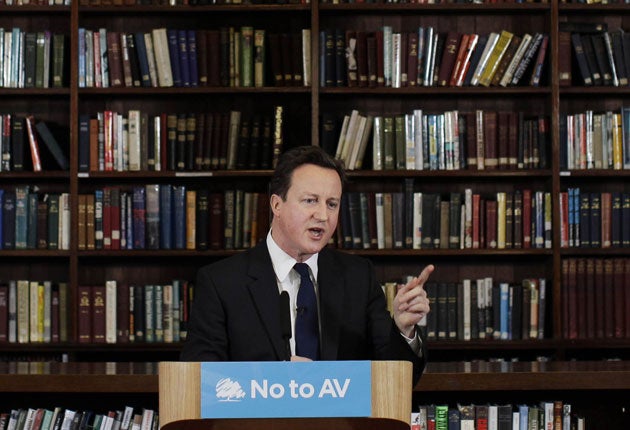Voting reform will not cause more cuts, Treasury insists
Minister's leaked letter counters Cameron's claim that AV would cost millions to implement

Your support helps us to tell the story
From reproductive rights to climate change to Big Tech, The Independent is on the ground when the story is developing. Whether it's investigating the financials of Elon Musk's pro-Trump PAC or producing our latest documentary, 'The A Word', which shines a light on the American women fighting for reproductive rights, we know how important it is to parse out the facts from the messaging.
At such a critical moment in US history, we need reporters on the ground. Your donation allows us to keep sending journalists to speak to both sides of the story.
The Independent is trusted by Americans across the entire political spectrum. And unlike many other quality news outlets, we choose not to lock Americans out of our reporting and analysis with paywalls. We believe quality journalism should be available to everyone, paid for by those who can afford it.
Your support makes all the difference.A fresh round of painful spending cuts will not be triggered by a change to the voting system, the Treasury has insisted in a leaked letter, which threatens to undermine claims made by opponents of electoral reform, including David Cameron.
First-past-the-post supporters have been accused of "shameful scaremongering" over claims that adopting the Alternative Vote system would cost £250m – including a disputed £130m on counting machines – and undermine frontline services. Controversial advertisements depicting a soldier and a sick baby needing better equipment and care and "not an alternative voting system" were promoted online and in a regional newspaper.
But Danny Alexander, the Lib Dem Chief Secretary to the Treasury, has denied the claims that a move to AV, under which voters rank candidates in order of preference, would force Whitehall departments to make more painful savings. In a letter from his private office, Mr Alexander insists: "The Government has no plans to reopen departmental spending review settlements as a consequence of a Yes vote in the referendum on AV."
He also confirms that £120m has already been set aside for the next general election, to come from the Cabinet Office budget, and reveals that the Treasury "has not received any advice on the assumptions behind the cost of the next general election should it be an AV election".
Mr Alexander, who backs AV, went further, telling The IoS: "I don't expect to see any increase in the cost of holding a general election if the British people vote yes. There's no good reason to believe that even under a new voting system an election would need to be more expensive."
The comments from the second most senior minister at the Treasury will seriously undermine the financial claims made by opponents of reform. Ben Bradshaw, the former Labour cabinet minister who wrote to Mr Alexander last week, said the Treasury's position "blows the No campaign's fake figures out of the water". He added: "The British people deserve an honest and open debate on the real issues of this referendum, not a bogus debate based on bogus figures. This kind of shameful scaremongering is exactly the type of old politics we need to change."
Mr Cameron said in a speech two weeks ago that AV would "increase the cost of politics" and be "a monumental waste of time, money and effort". The Prime Minister repeated the claim that AV may also necessitate the purchase and installation of "electronic voting machines to make sense of all the different outcomes and possibilities".
The machines were central to the claim by the No to AV lobby that the change would cost £250m. "With families facing tough times can we really afford to spend a quarter of a billion pounds of taxpayers' money [on] a new voting system?" a spokesman said.
The Electoral Commission insists there are no plans for counting machines, which are not used in Australia where AV has been in use for decades to elect the lower house of parliament. But No to AV has seized on the revelation that a division of the Electoral Reform Society, which has given £1m to the Yes campaign, is also a commercial supplier of election services, including counting machines, which could benefit from a change in the voting system.
Join our commenting forum
Join thought-provoking conversations, follow other Independent readers and see their replies
Comments